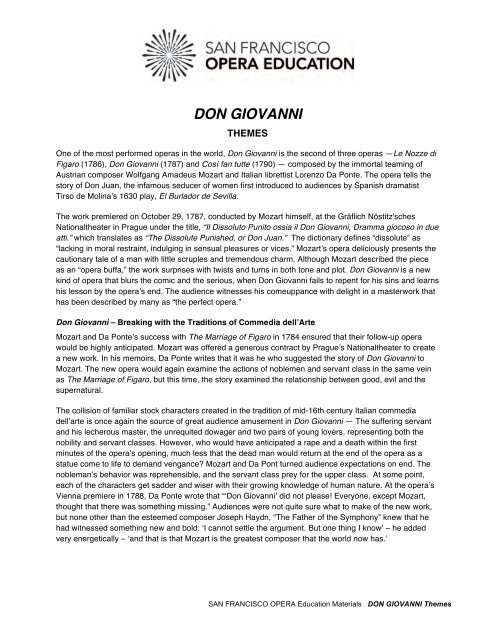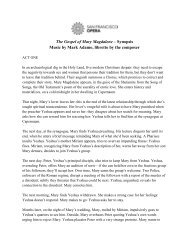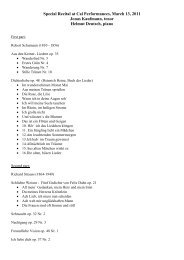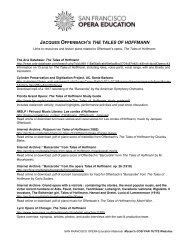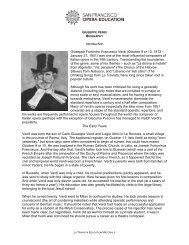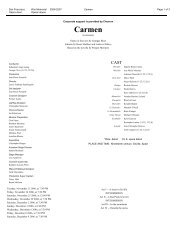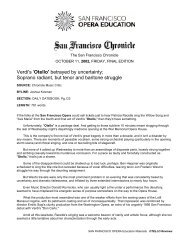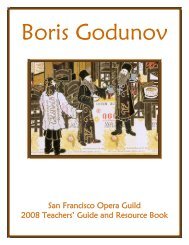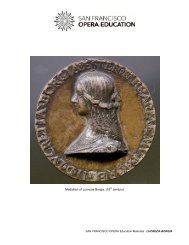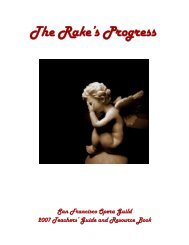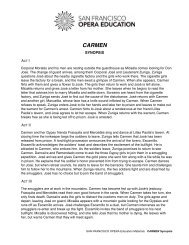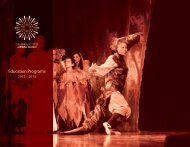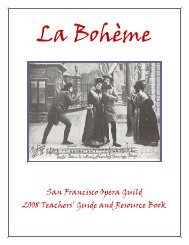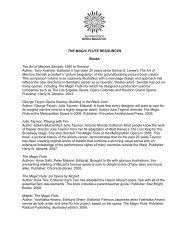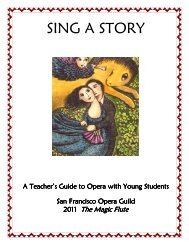Don Giovanni Themes - San Francisco Opera
Don Giovanni Themes - San Francisco Opera
Don Giovanni Themes - San Francisco Opera
Create successful ePaper yourself
Turn your PDF publications into a flip-book with our unique Google optimized e-Paper software.
DON GIOVANNI<br />
THEMES<br />
One of the most performed operas in the world, <strong>Don</strong> <strong>Giovanni</strong> is the second of three operas —Le Nozze di<br />
Figaro (1786), <strong>Don</strong> <strong>Giovanni</strong> (1787) and Così fan tutte (1790) — composed by the immortal teaming of<br />
Austrian composer Wolfgang Amadeus Mozart and Italian librettist Lorenzo Da Ponte. The opera tells the<br />
story of <strong>Don</strong> Juan, the infamous seducer of women first introduced to audiences by Spanish dramatist<br />
Tirso de Molinaʼs 1630 play, El Burlador de Sevilla.<br />
The work premiered on October 29, 1787, conducted by Mozart himself, at the Gräflich Nöstitz'sches<br />
Nationaltheater in Prague under the title, “Il Dissoluto Punito ossia il <strong>Don</strong> <strong>Giovanni</strong>, Dramma giocoso in due<br />
atti.” which translates as “The Dissolute Punished, or <strong>Don</strong> Juan.” The dictionary defines “dissolute” as<br />
“lacking in moral restraint, indulging in sensual pleasures or vices.” Mozartʼs opera deliciously presents the<br />
cautionary tale of a man with little scruples and tremendous charm. Although Mozart described the piece<br />
as an “opera buffa,” the work surprises with twists and turns in both tone and plot. <strong>Don</strong> <strong>Giovanni</strong> is a new<br />
kind of opera that blurs the comic and the serious, when <strong>Don</strong> <strong>Giovanni</strong> fails to repent for his sins and learns<br />
his lesson by the operaʼs end. The audience witnesses his comeuppance with delight in a masterwork that<br />
has been described by many as “the perfect opera.”<br />
<strong>Don</strong> <strong>Giovanni</strong> – Breaking with the Traditions of Commedia dellʼArte<br />
Mozart and Da Ponteʼs success with The Marriage of Figaro in 1784 ensured that their follow-up opera<br />
would be highly anticipated. Mozart was offered a generous contract by Pragueʼs Nationaltheater to create<br />
a new work. In his memoirs, Da Ponte writes that it was he who suggested the story of <strong>Don</strong> <strong>Giovanni</strong> to<br />
Mozart. The new opera would again examine the actions of noblemen and servant class in the same vein<br />
as The Marriage of Figaro, but this time, the story examined the relationship between good, evil and the<br />
supernatural.<br />
The collision of familiar stock characters created in the tradition of mid-16th century Italian commedia<br />
dellʼarte is once again the source of great audience amusement in <strong>Don</strong> <strong>Giovanni</strong> — The suffering servant<br />
and his lecherous master, the unrequited dowager and two pairs of young lovers, representing both the<br />
nobility and servant classes. However, who would have anticipated a rape and a death within the first<br />
minutes of the operaʼs opening, much less that the dead man would return at the end of the opera as a<br />
statue come to life to demand vengance? Mozart and Da Pont turned audience expectations on end. The<br />
noblemanʼs behavior was reprehensible, and the servant class prey for the upper class. At some point,<br />
each of the characters get sadder and wiser with their growing knowledge of human nature. At the operaʼs<br />
Vienna premiere in 1788, Da Ponte wrote that “ʻ<strong>Don</strong> <strong>Giovanni</strong>ʼ did not please! Everyone, except Mozart,<br />
thought that there was something missing.” Audiences were not quite sure what to make of the new work,<br />
but none other than the esteemed composer Joseph Haydn, “The Father of the Symphony” knew that he<br />
had witnessed something new and bold: ʻI cannot settle the argument. But one thing I knowʼ – he added<br />
very energetically – ʻand that is that Mozart is the greatest composer that the world now has.ʼ<br />
SAN FRANCISCO OPERA Education Materials DON GIOVANNI <strong>Themes</strong>
The Juxtaposition of the Serious and the Comic<br />
Mozart labeled <strong>Don</strong> <strong>Giovanni</strong> an “opera buffa,” (comic opera), but the opera depends on commonly found<br />
aspects of “opera seria” (serious opera), such as betrayal, violence, death, and a calculating villain to<br />
provide the tension that drives the operaʼs action forward. The operaʼs story and music constantly show<br />
characters in opposition, exhibiting a range of feelings and behaviors, constantly changing colors in a<br />
dazzling kaleidoscope of human expression.<br />
Happiness/Misery<br />
With the operaʼs opening scene, the duality of human emotions explored throughout the opera is evident.<br />
<strong>Don</strong> <strong>Giovanni</strong>ʼs dismisses his villanous act, the murder of the Commendatore with this light exchange<br />
directed at his servant Leporello.<br />
Rash old man, I have undone thee!<br />
In the pangs of death thou'rt lying!<br />
Mine's the deed, there's no denying.<br />
Why to fight was I beguil'd?<br />
<strong>Don</strong>na Anna realizes that she is in some respects responsible for her fatherʼs death. His paternal love for<br />
her demanded that he defend her honor against the libertine <strong>Don</strong> <strong>Giovanni</strong>.<br />
'Twas here I left him.<br />
seeing the corpse<br />
What is this I behold?<br />
Can I believe my senses,<br />
Ah, me unhappy!<br />
My father, oh, my father, look upon me!<br />
<strong>Don</strong>na Anna asks <strong>Don</strong> Octavio to swear that he will avenge her fatherʼs death, and he gladly answers:<br />
I swear it,<br />
By heav'n I will avenge him,<br />
I swear it by our love!<br />
Jealousy/Trust<br />
With the famous “Catalog Aria,” <strong>Don</strong>na Elvira expresses her upset with <strong>Don</strong> <strong>Giovanni</strong> deception only to be<br />
subjected to Leporelloʼs attempt to comfort her by sharing of the written account of <strong>Don</strong> <strong>Giovanni</strong>ʼs<br />
conquests. He is an equal opportunity seducer of women all over Europe (The headcount: 640 in Italy, 520<br />
in France, 200 in the Rhineland, and 1003 in Spain.)<br />
The following scene finds Zerlina and Masetto ready to be married, and <strong>Don</strong> <strong>Giovanni</strong> takes no time at all to<br />
woo the bride-to-be. <strong>Don</strong> <strong>Giovanni</strong> instructs Leporello to ply the guests and the groom, his “friend Masetto”<br />
with refreshments and pleasures. Zerlina tells Masetto that they have nothing to fear for the <strong>Don</strong> is a<br />
gentleman. Masetto protests, and he is threatened with the sword, and reminded of his place by <strong>Don</strong> <strong>Giovanni</strong>.<br />
Masetto mine, beware, or you'll repent it!<br />
Betrayal/Forgiveness<br />
When <strong>Don</strong>na Elvira attempts to warn the others, <strong>Don</strong> <strong>Giovanni</strong> tries to pursuade them that Elvira is crazy,<br />
and <strong>Don</strong>na Ann recognizes the voice of the man who murdered her father. <strong>Don</strong> Octavio is determined to<br />
bring the killer to justice as a display of his love and devotion to <strong>Don</strong>na Anna.<br />
SAN FRANCISCO OPERA Education Materials DON GIOVANNI <strong>Themes</strong>
I can scarely believe it,<br />
That of crimes so degrading a noble can be guilty!<br />
Closely I will pursue him,<br />
Till the truth is discovered,<br />
Ev'ry emotion, my allegiance to the dear one<br />
Whom my faith I have plighted,<br />
Bids me avenge her wrongs and see her righted.<br />
<strong>Don</strong>na Anna, <strong>Don</strong> Octavio, <strong>Don</strong>na Elvira, Zerlina and Masetto unite. All are determined to catch <strong>Don</strong><br />
<strong>Giovanni</strong>, and even Leporello struggles to come to terms with his masterʼs ways, even as he adopts his<br />
masterʼs strategies of deception.<br />
I'll stay with him no longer,<br />
I will not have this madman for a master!<br />
See, there he comes, look at him,<br />
So cool, just as if nothing e'er had happened.<br />
When <strong>Don</strong> <strong>Giovanni</strong> is finally cornered, he has no trouble trying to force the blame on his faithful servant.<br />
The group angrily accuses him of his transgressions, but both <strong>Don</strong> <strong>Giovanni</strong> and Leporello are aware that<br />
they are no match for the nobleman. He is not easily intimidated.<br />
But my (his) courage ne'er forsook me, (him)<br />
And I'll (He) face the matter boldly,<br />
All their threats shall not withhold me, (him)<br />
Tho' a sign from heav'n should fall.<br />
A Higher Calling<br />
In the end, it takes a supernatural power to call <strong>Don</strong> <strong>Giovanni</strong> to task. The statue of the dead<br />
Commendatore comes to the door, demanding company for dinner, and <strong>Don</strong> <strong>Giovanni</strong> has no choice but to<br />
go. Even as the earth trembles and flames surround him, he refuses to repent, demanding that the statue<br />
“vanish thou from my sight!” He is dragged down to Hell, doomed to suffer in eternity, locked in the tight<br />
grip of the Commendatoreʼs handshake.<br />
My soul is rent in agony!<br />
Condemn'd to endless misery,<br />
Oh, doom of wrath and terror,<br />
No more to see the light!<br />
When the company commands the stage, <strong>Don</strong>na Anna and <strong>Don</strong> Octavio take the time to build their trust<br />
and love, Zerlina and Masetto rush to be wed, <strong>Don</strong>na Elvira is set for the convent, and Leporello is ready to<br />
seek another master and begin another life. They lift their voices together to sing happily for the audience<br />
to heed the tale of the recently departed dissolute — <strong>Don</strong> <strong>Giovanni</strong>, the man who desired his “cup of<br />
pleasure” and insisted he would “drain it to the end.”<br />
He who wrought for selfish pleasure,<br />
Shall depart without, yes without a friend.<br />
SAN FRANCISCO OPERA Education Materials DON GIOVANNI <strong>Themes</strong>


